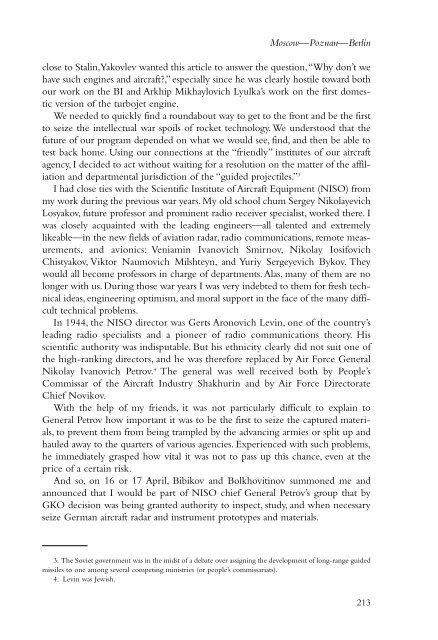to open next chapter. - NASA's History Office
to open next chapter. - NASA's History Office
to open next chapter. - NASA's History Office
Create successful ePaper yourself
Turn your PDF publications into a flip-book with our unique Google optimized e-Paper software.
Moscow—Poznan—Berlin<br />
close <strong>to</strong> Stalin,Yakovlev wanted this article <strong>to</strong> answer the question,“Why don’t we<br />
have such engines and aircraft?,” especially since he was clearly hostile <strong>to</strong>ward both<br />
our work on the BI and Arkhip Mikhaylovich Lyulka’s work on the first domestic<br />
version of the turbojet engine.<br />
We needed <strong>to</strong> quickly find a roundabout way <strong>to</strong> get <strong>to</strong> the front and be the first<br />
<strong>to</strong> seize the intellectual war spoils of rocket technology. We unders<strong>to</strong>od that the<br />
future of our program depended on what we would see, find, and then be able <strong>to</strong><br />
test back home. Using our connections at the “friendly” institutes of our aircraft<br />
agency, I decided <strong>to</strong> act without waiting for a resolution on the matter of the affiliation<br />
and departmental jurisdiction of the “guided projectiles.” 3<br />
I had close ties with the Scientific Institute of Aircraft Equipment (NISO) from<br />
my work during the previous war years. My old school chum Sergey Nikolayevich<br />
Losyakov, future professor and prominent radio receiver specialist, worked there. I<br />
was closely acquainted with the leading engineers—all talented and extremely<br />
likeable—in the new fields of aviation radar, radio communications, remote measurements,<br />
and avionics: Veniamin Ivanovich Smirnov, Nikolay Iosifovich<br />
Chistyakov, Vik<strong>to</strong>r Naumovich Milshteyn, and Yuriy Sergeyevich Bykov. They<br />
would all become professors in charge of departments.Alas, many of them are no<br />
longer with us. During those war years I was very indebted <strong>to</strong> them for fresh technical<br />
ideas, engineering optimism, and moral support in the face of the many difficult<br />
technical problems.<br />
In 1944, the NISO direc<strong>to</strong>r was Gerts Aronovich Levin, one of the country’s<br />
leading radio specialists and a pioneer of radio communications theory. His<br />
scientific authority was indisputable. But his ethnicity clearly did not suit one of<br />
the high-ranking direc<strong>to</strong>rs, and he was therefore replaced by Air Force General<br />
Nikolay Ivanovich Petrov. 4 The general was well received both by People’s<br />
Commissar of the Aircraft Industry Shakhurin and by Air Force Direc<strong>to</strong>rate<br />
Chief Novikov.<br />
With the help of my friends, it was not particularly difficult <strong>to</strong> explain <strong>to</strong><br />
General Petrov how important it was <strong>to</strong> be the first <strong>to</strong> seize the captured materials,<br />
<strong>to</strong> prevent them from being trampled by the advancing armies or split up and<br />
hauled away <strong>to</strong> the quarters of various agencies. Experienced with such problems,<br />
he immediately grasped how vital it was not <strong>to</strong> pass up this chance, even at the<br />
price of a certain risk.<br />
And so, on 16 or 17 April, Bibikov and Bolkhovitinov summoned me and<br />
announced that I would be part of NISO chief General Petrov’s group that by<br />
GKO decision was being granted authority <strong>to</strong> inspect, study, and when necessary<br />
seize German aircraft radar and instrument pro<strong>to</strong>types and materials.<br />
3. The Soviet government was in the midst of a debate over assigning the development of long-range guided<br />
missiles <strong>to</strong> one among several competing ministries (or people’s commissariats).<br />
4. Levin was Jewish.<br />
213
















